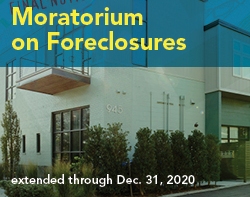Foreclosure Actions and COVID – An Update
 Regular readers of this blog have been able to get information on how the COVID-19 pandemic has affected foreclosure actions in New York. This post will serve as an update on current conditions in New York Courts.
Regular readers of this blog have been able to get information on how the COVID-19 pandemic has affected foreclosure actions in New York. This post will serve as an update on current conditions in New York Courts.
At the beginning of the pandemic, New York Courts closed for all matters, including foreclosure cases. In addition, executive orders from Governor Cuomo stayed all foreclosure cases from proceeding. This meant that, at that time, no new foreclosure cases could be filed, and all foreclosure cases previously filed would not be allowed to proceed until allowed by New York State.
This obviously was a benefit to any party subject to a foreclosure action. Even if the Court had, before the pandemic, granted a judgment of foreclosure and sale, the actual sale was not allowed to proceed. In addition, both New York State and the federal government imposed further legal restrictions on all evictions. This meant that even if the foreclosure sale had occurred prior to the “freezing” of all foreclosure cases, the new owner, whether it was the original lender or a successful bidder at a sale, had no legal means of evicting the former owner.
Evictions in New York: Legal and Illegal
 A recent story in the New York Post discusses a lawsuit brought by the City of New York against a prominent couple who are the owners and landlords of a brownstone located in the Crown Heights neighborhood of Brooklyn. According to the allegations in the lawsuit, the couple sought to evict their tenants without any legal process. In more detail, they are accused of, among other actions, using force and threatening to use force to induce occupants to vacate, removing occupants’ possessions from the Premises, and changing entrance door locks to the Premises without supplying replacement keys to the occupants.
A recent story in the New York Post discusses a lawsuit brought by the City of New York against a prominent couple who are the owners and landlords of a brownstone located in the Crown Heights neighborhood of Brooklyn. According to the allegations in the lawsuit, the couple sought to evict their tenants without any legal process. In more detail, they are accused of, among other actions, using force and threatening to use force to induce occupants to vacate, removing occupants’ possessions from the Premises, and changing entrance door locks to the Premises without supplying replacement keys to the occupants.
The lawsuit seeks civil penalties for violations of the New York City Unlawful Eviction Law, as well as a permanent injunction prohibiting the owners from engaging in any further attempt at unlawful eviction of tenants and occupants, or any further tenant harassment.
Our firm has consulted with many landlords over the years regarding potential evictions of tenants. One course of action that we would never advise a landlord to do is to attempt to evict the tenant themselves, without the benefit of the legal process. While there are obviously many problem tenants, all tenants in New York State are protected by laws relating to evictions. Any eviction must start by serving the tenants with the initial notices (known as predicate notices) which advise the tenants that an eviction action may be brought in the future, either because the lease has expired, or because the tenant has failed to pay rent due.
COVID-19 and Evictions in New York
 A recent news story in the New York Post raises important issues regarding the effects of the coronavirus pandemic on evictions in New York State. According to the report, an “Intragram influencer” named Marisa Hochberg owes at least $14,000.00 in past due rent on her summer rental in Montauk, and has refused to vacate the premises, even though her lease expired several months ago.
A recent news story in the New York Post raises important issues regarding the effects of the coronavirus pandemic on evictions in New York State. According to the report, an “Intragram influencer” named Marisa Hochberg owes at least $14,000.00 in past due rent on her summer rental in Montauk, and has refused to vacate the premises, even though her lease expired several months ago.
In ordinary times, an eviction action would be brought by the attorneys for the homeowners in the local landlord-tenant Court, seeking to evict the tenant. In the Hochberg case, the tenant could be the subject of either a holdover action, or a non-payment action. First, as her lease expired by its terms, this makes her a month-to-month tenant subject to termination on proper notice (holdover action). Second, as she has failed to pay rent due, this also allows the possibility of a non-payment proceeding being brought against her.
However, as our readers are aware, these are not ordinary times. Not all landlord-tenant courts, which are local in nature, are scheduling and hearing cases on a regular basis, due to COVID concerns. Before attempting to file a case in a local landlord-tenant Court, experienced counsel should contact the Court directly to ensure that they are accepting and scheduling new cases.
An Improbable Relationship Leads to a Contested Will
 Successful contemporary art dealer Andre Zarre passed away and left his massive multi-million dollar estate solely to a deli worker, who was also nominated as Executor to the estate. Does this situation strike our readers as a legal result that can be contested? The answer is yes, for the reasons discussed in this post.
Successful contemporary art dealer Andre Zarre passed away and left his massive multi-million dollar estate solely to a deli worker, who was also nominated as Executor to the estate. Does this situation strike our readers as a legal result that can be contested? The answer is yes, for the reasons discussed in this post.
Although Zarre was a successful art dealer, his entrepreneurial spirit led to his eventual ownership of a Queens deli. The deli worker Jose Yeje was either in charge of the deli or a co-owner, depending upon the version of events that one wants to believe. Zarre’s health deteriorated to the extent that he eventually became legally blind, had significant mobility issues, and advanced heart disease. At the same time, the relationship between Zarre and Yeje progressed to the point that Yeje became Zarre’s trusted caretaker. Then, Zarre signed the subject Will, shortly before his death.
When an estate is administered , the executor of a will needs to obtain waivers from those who could inherit under New York’s intestacy statute . Otherwise, such persons maintain their legal right to challenge the will being sought to be admitted to probate. Yeje’s legal counsel approached Zarre’s cousin to obtain such a waiver. The cousin was shocked because Zarre had previously promised to leave his estate to the cousin and potentially other relatives. It will remain to be seen how the Surrogate’s Court will evaluate the validity of this promise. When a waiver is not delivered, the proponent of the will then needs to serve the person requested to waive with a citation to attend a Court appearance for the purpose of raising legal issues why the will should not be admitted to probate.
Division of the Proceeds in a Partition Action in New York
 Our firm often handles partition matters where two or more people co-own a property. Under New York law, no one is forced to co-own property if they do not want to. As a result, a partition action may be brought to have the property sold by the Court and the proceeds fairly divided between the co-owners.
Our firm often handles partition matters where two or more people co-own a property. Under New York law, no one is forced to co-own property if they do not want to. As a result, a partition action may be brought to have the property sold by the Court and the proceeds fairly divided between the co-owners.
Most, if not all, of partition actions are settled without actually having a Court-ordered sale of the property. Usually the parties reach an agreement to either sell the property to a third party or arrange to have one of the parties buy the other’s interest in the property.
However, the question usually arises regarding what may be a fair division of the proceeds in the resolution of a partition case. This post will explore the various factors which may arise in such a situation.
Foreclosures – Judicial and Non-Judicial
 Some of our prior blog posts have dealt with foreclosure actions concerning real property. A recent New York Supreme Court case, however, deals with a different type of foreclosure, and the effects of the COVID-19 pandemic on the same.
Some of our prior blog posts have dealt with foreclosure actions concerning real property. A recent New York Supreme Court case, however, deals with a different type of foreclosure, and the effects of the COVID-19 pandemic on the same.
Most foreclosure cases in New York State are of the judicial type, and deal with the foreclosure of real property. In a judicial foreclosure, the owner of real property gives a mortgage and note to a lender, in exchange for a loan. The real property is collateral for the loan. If the borrower fails to repay the loan, or otherwise defaults on the loan by failing to follow the loan terms, the lender may file a foreclosure action in the appropriate New York State Court, which would be the Supreme Court in the county in which the property is located.
New York State currently has a moratorium, due to the effects of the coronavirus, on judicial foreclosures. Under this Administrative Order, “no auction or sale of property in any residential or commercial matter shall be scheduled to occur prior to October 15, 2020.” However, not every foreclosure case in New York is a judicial foreclosure, requiring a Court proceeding. Non-judicial foreclosures occur most commonly in coop matters. An owner of a cooperative apartment does not own real property, but, rather, shares in the cooperative corporation, which, in turn, owns the real property on which the building is located. As a result, if the shareholder defaults on a share loan, the lender may foreclosure on the shares without Court intervention. The lender can issue notices under the Uniform Commercial Code (UCC), which is integrated into New York law, and have an auction sale under the UCC rules, without going to Court.
Changing Conditions in New York’s Commercial Leasing Landscape Require Flexible Strategies

We note that recent news concerning New York’s commercial real estate landscape has been rapid and stunning. Iconic businesses such as Sears, JC Penney, Modell’s and Brooks Brothers have filed for bankruptcy protection or closed retail stores, office spaces remain underutilized and the restaurant business is experiencing significant challenges. Tenants that remain are rethinking their need for expensive commercial space. Landlords are considering converting properties to new uses in order to fully lease available space. This post will examine some of the current trends in commercial leasing and provide suggestions as to how such challenges may be overcome.
Century 21, the iconic downtown Manhattan retail fixture, announced that it is closing all of its stores. As we reflect on the 9/11 terrorist attacks today, we also recall that Century 21 was committed to operating near the World Trade Center, rebuilt and reopened. Unfortunately, the effects of Coronavirus on its business could not be overcome due to the tenant’s inability to collect on its claim for business interruption insurance. Such insurance may be required by a landlord in a commercial lease. It provides that if a tenant’s business is interrupted, that lost revenues and the like will be paid and will cover the rent that the tenant could not pay due to lost revenues. Business interruption insurance covers lost revenues due to physical damage from terrorist attack or casualty, but often contains exclusions for matters such as a pandemic. Even though common sense dictates that coronavirus has interrupted business to the extent that insurers should cover the claims, many tenants have been unable to collect on such insurance and use those funds to become current on their rent obligations. Without revenues, tenants have been otherwise unable to pay their rent and have decided to vacate space.
In the office market, Covid 19 has frightened corporate leaders and employees, leading to many expecting to work from home for months to come. This is leading to high office vacancy rates and new leases (if any) for shorter terms. Subleases may become more prevalent so that tenants do not have to commit to long-term financial obligations.






